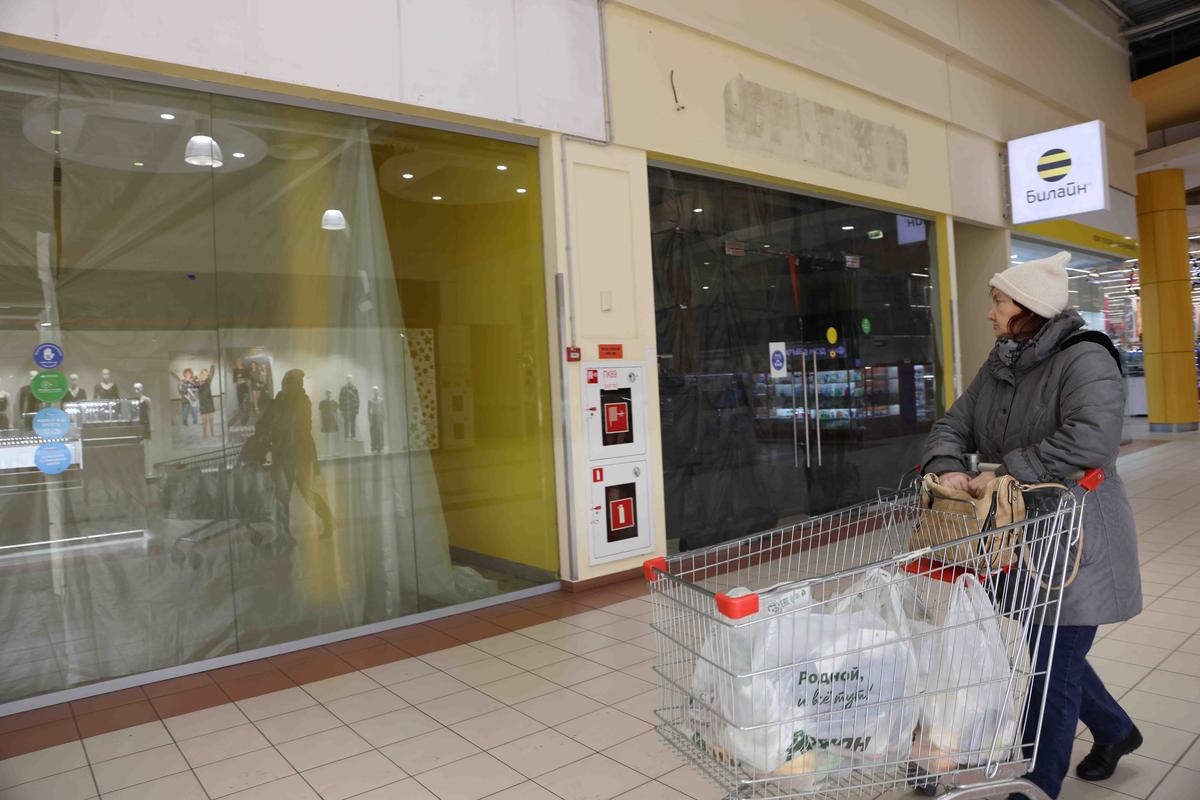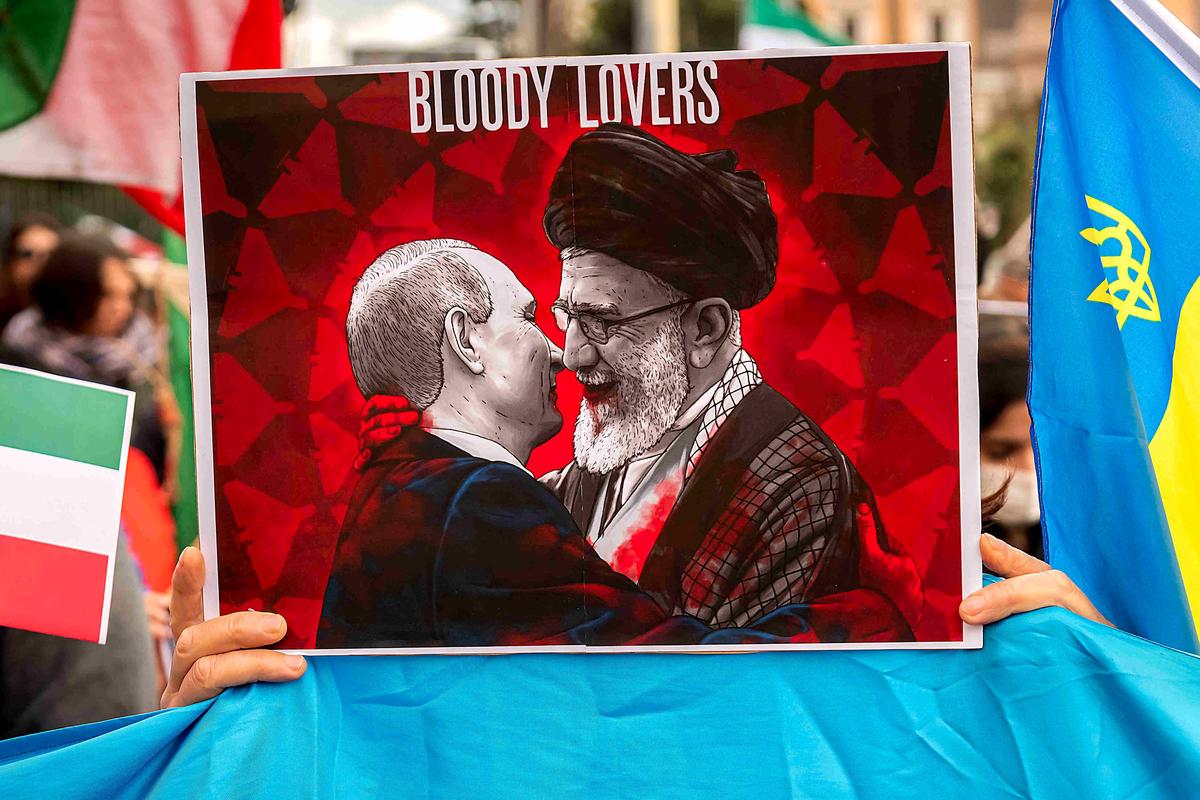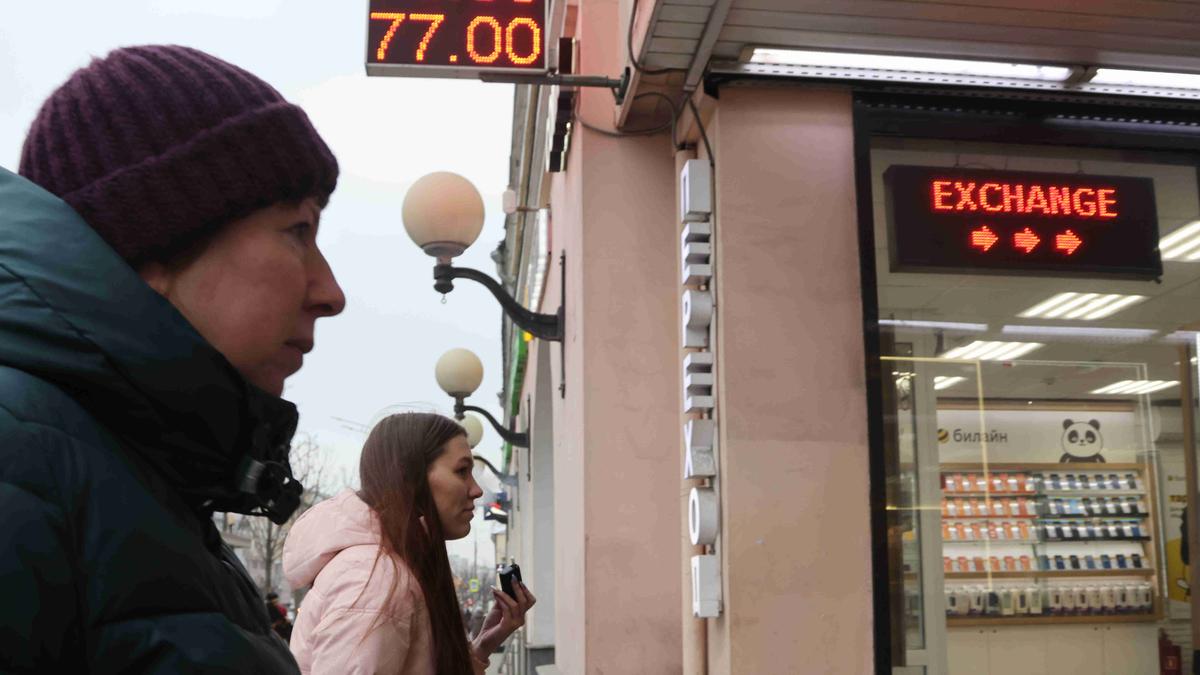When the USSR began to industrialise about a century ago, it did so at the expense of Western technology and engineers from the United States and Europe. Today, Russia, having unleashed an aggressive war against Ukraine, finds itself cut off from the West, which means that it will have to switch to much older production technologies. The overall losses of Russia due to the war will run into trillions of dollars, says economist, visiting professor at City University of New York, author of “Global inequality” and “Capitalism, Alone” Branko Milanović.
So far, however, the economy shows resilience to sanctions, and the authorities find ways to buy Western high-tech goods through third countries. We talked to Professor Milanović about the possibility of autarky in the 21st century, Russia’s alliance with Iran and China, and Vladimir Putin’s initial goals for the war in Ukraine.

Branko Milanović
economist, visiting professor at City University of New York, author of “Global inequality” and “Capitalism, Alone”
The road to regression
You’ve spoken about “regressive import substitution” in Russia’s economy, claiming that such an experiment has never taken place before. What do you mean by that and what’s so unique about this situation?
Import substitution has historically been, as the term suggests, an attempt by countries to industrialise and to develop new products using the technology of the countries that have already become more developed. Look not necessarily at the Soviet Union, but also at [South] Korea, Brazil or Turkey. They would import technology from Germany, the UK, the US, and then would start to produce things like cars, for example. Take Korea — until 1965, Korea didn’t produce any cars. And then they actually developed their domestic production and thereby substituted the import. That’s the definition.
What’s new in this particular case with Russia is that since it’s unable to borrow or buy the technology from more developed countries, it has to go into import substitution using the technologies from the past. Again, car production is a very good example, as you know, with Renault and Moskvich in Moscow. Basically, it’s using a technology which existed about 20-30 years ago. That’s what I meant by regressive import substitution. And that has never happened before.
It didn’t happen to the Soviet Union, because if you read, for example, the 1930s statistics, and if you look at all these large factories which were developed in the Soviet Union, they were all using top technology. A good example of that is the famous tractor factory in Stalingrad, now Volgograd. But this time it’s different. We are not talking about import substitution in the usual sense, but about regressive import substitution.
There’s proof that Russia continues to receive high-tech goods (like microchips) despite the sanctions. It is much more difficult to control such trade today than in Soviet times, for example. Is regressive substitution inevitable?
First of all, sanctions are not the same as a trade embargo. Trade embargo means that nobody can trade with you. Sanctions are restrictions by one part of the world, one group of countries, against another country. So this always means that there will be ways of buying from other countries and particularly from China. You could also have the so-called parallel import (import without the permission of the intellectual property owner — editor’s note) or contraband. It’s not a zero-one.
But it doesn’t always work with important technologies such as cars or aeroplanes. You cannot replace a Boeing wing by getting it on the black market in Zambia. It’s not replaceable. Of course, you would replace iPhones. You would replace domestic consumption goods, TV sets. There would be parallel import and these goods would go through Armenia, Turkmenistan, Kazakhstan, and so on. But for a technologically advanced country like Russia, replacing certain things would be very difficult or even impossible in some cases. For example, the biometric passports with a chip inside are no longer issued because there’s a shortage of these chips. There would be problems like that all over.
What’s also crucial is that things like parallel import or sometimes even import through contraband or counterfeit do not engage good people. These people are dealing with the black market, they are semi-criminals. But the state cannot go against them because these people now become absolutely crucial for the maintenance of certain types of production.
So eventually you might end up with a state which is essentially being taken over by the semi-criminal gang. I think this effect of sanctions is very important but not really studied or pointed out.

Photo: Contributor / Getty Images
Autocracies with autarky
Technological backdrop is a mid to long-term problem, but many people expect the sanctions to work right away. At the same time, Russia might remain under sanctions for decades even after the war ends. Does that mean that the sanctions are aimed mostly at weakening the country in the long-term in order to avoid another catastrophe like the war in Ukraine?
I do agree with you, I think the sanctions will be there for a long time. I base that on past experience of sanctions. [Today] no one even knows why the sanctions on Cuba still exist. Obama went there to open the embassy but nothing has changed. Cubans who live in the United States haven’t been able to send their own money to their family in Cuba since the 1960s. .
When you have enough people in the Congress or in the European Parliament to impose the sanctions, removing them becomes extremely difficult because everybody has an incentive to put something else in additional sanctions, but nobody has an incentive to remove them. So that’s why I think they are going to remain for a very long time.
As a silver lining, you could say that to the extent that Russia is forced to give up on easy money that it was getting from gas and oil, it would actually go into more complex production. One of the typical issues that economists mention is the issue of resource curse.
When you have large exports, these exports make your exchange rate overvalued. The overvalued exchange rate means that other products become too expensive [to produce]. So the argument often is “Don’t use the easy money, create production of something else.” Of course, nobody does that because easy money is easy money. But when you cannot export as much or depend as much on oil and gas money, then of course, there will be some new goods that you might start producing.
My opinion is that we should not look at the effect of sanctions in the short-run, but really in the long-run. Their objective is, as you said, to weaken the Russian economy.
There are countries like Iran that have been living under sanctions for decades. These countries do fall behind technology-wise, but not always drastically. Sometimes they even manage to develop sophisticated products (ranging from military drones to nuclear weapons). Are autarkies really that non-viable?
Well, they are always viable. Countries don’t collapse simply because there is a certain autarkic situation (autarky is a state of having a closed off economy with limited foreign trade; all or almost all commodities required for consumption are produced domestically in this type of economy — editor’s note). And on top of that, Russia is a big country and it is self-sufficient in two important respects: food and energy. These two aspects are hugely important for a country because if people have nothing to eat and there is no energy, you are in big trouble. So in that sense, Russia being a big country has certain advantages.
Iran has also been living under the sanctions. However, these are not the same sanctions. The US has a sanctions regime against Iran and they indirectly obliged the European Union to have sanctions in some areas, too, but not in all the other areas. But, as you know, the sanctions against Russia are much more comprehensive, so that there is a difference between Iran and Russia.
On the other hand, Russia has technological knowledge, technological basis and lots of people who are highly educated. So, yes, they will be able to produce certain things. In some instances, they could do a very good job, produce something which they would not have produced otherwise. But it would be the necessity pushing them to produce.
It’s not that once you have imposed autarky, everything falls apart. It doesn’t.

A sign with photo of the Supreme Leader of Iran Ali Khamenei and President of Russia Vladimir Putin during the demonstration in support of the Iranian community in the "Woman, Life, Freedom". Photo: Stefano Montesi — Corbis/Corbis via Getty Images
There was news about China overtaking the US in the number of citations in academic articles regarding AI. There are also some sectors where China competes on the same level as the West — like 5G network and electric cars. Can it become the new supplier of technological goods for Russia? Why don’t you believe in Russia “turning to the East” completely?
Yeah, I think actually China can [become the new supplier for Russia]. Chinese companies are afraid of the secondary sanctions from the US. But it’s also true that if the US continues with the current policy against China, which is detrimental to both the US and China, at some point the Chinese companies will have nothing to fear.
The other day, I saw a ridiculous thing in this regard. In Australia, Chinese-made CCTV cameras are now being taken down from buildings because supposedly they are sending information to China.
Let’s say you are the company that produces these cameras. If American or Australian senators tell you they are not not going to buy anything from you, then obviously you’re going to close down the factory and the secondary sanctions will have no meaning for you. So you’d hold your money in Singapore and sell these cameras to Russia.
The United States, to some extent, is undermining its own position vis-à-vis Russia by being tough on China because it leaves no other possibility to the Chinese companies than to go and to sell their products to Russia.
The more China is interdependent with the US, the stronger is the effect of the sanctions on Russia. In other words, the more the Chinese companies are afraid of breaking sanctions, consequently the less they will deal with Russia. But the more the US cuts that interdependence, the easier it is for the Chinese companies to also ignore the Western market and go to the Russian market instead.
As to “turning to the East”, the short-term effects of the sanctions have been mild, the Central Bank managed affairs very well. Real incomes declined by 1% only.
But in the longer-term, if the sanctions stay for 40-50 years, the government will have to start thinking about “turning to the East”. The population composition in Russia, however, is Western-oriented in the sense that the majority of big cities and most of the production are in the European part of Russia (about 110 of the 144 million Russians live in the European part of the country — editor’s note). Moving east theoretically would make sense, since the Pacific side of the world is the growing side and the European side is the declining side. But it’s not easy.
You have Moscow with a population of more than 10 million people. All these people cannot just move to Vladivostok. Also the transport links are bad, it takes a week to get from Moscow to Vladivostok by train. But as the activity shifts towards the east, yes, people will shift as well. If Russia had the infrastructure that China has built in the last 20 years with the trains, it would be easier to do it.

People arriving from Russia through the Verkhny Lars border crossing wait for a taxi for onward travel in Dariali, Georgia, on Friday, Sept. 30, 2022. Photo: Tako Robakidze / Bloomberg / Getty Images
In 2022, roughly half a million people left Russia because of the war. That’s another effect of the war, which some economists consider to be one of the most important in terms of economic impact. Do you agree?
Russia has lost billions, if not trillions [due to sanctions]. The seizure of assets is up to $600-700 billion and people don’t even realise how big this number is. It’s almost one third of Russia’s GDP. It’s actually more than the entire Pentagon’s budget for this year. Essentially Russia is funding this year’s Pentagon’s budget. That’s one thing.
Secondly, the loss of human capital is enormous. Basically, you have two huge losses — in financial and human assets. When you put these two things together, put some numbers down, you will run into trillions of dollars. And for a government to give up trillions of dollars for a war, which in itself is unjustified, is a madness.
If you actually decide to fight with somebody, you don’t keep all your money in their pocket. This is rule number one. It’s like a divorce. If you want to divorce your wife or your husband, you don’t give them all your money beforehand and then say “I guess I’m filing for a divorce”. It’s pure madness.
The oligarch paradox
Will sanctions increase economic inequality inside Russia? On the one hand, rich people lose assets abroad, but on the other hand, they get an opportunity to gain some new assets after the Western firms leave the Russian market. And the regular people are the ones affected the most by inflation and the disappearance of consumer goods.
That’s a very good question. We don’t really have empirical evidence of the effect of the sanctions [on inequality]. Iran produces the income distribution data. But I really am not sure that anybody has looked specifically at the effect of the sanctions in this regard. What you say makes a lot of sense. There could be losses in middle class incomes and in lower-income homes. But a lot of that would depend on the macro management.
Russian economist Natalya Zubarevich talks about four Russias. So for people in rural Russia, the people who do not consume foreign-made products, it doesn’t really matter that much. But as we move towards more urbanised Russia and towards the middle class, I think there would be losses there because the markets these people interacted with would disappear. What will happen at the top I really don’t know. One group of oligarchs could lose their money and maybe another group might come. It’s too early to tell.
What conclusion will the super-rich in the West draw from the sanctions? Do they feel threatened that politicians can now reach them more easily and put their money and political power under scrutiny?
I don’t think they’ll be affected. I didn’t see any Western oligarchs being pursued because of their connections with the Russian oligarchs. I think this whole chapter has been closed. The West and England in particular happily took Russian money. The most expensive lawsuit was between Berezovsky and Abramovich, people who worked on that case made millions of dollars. That’s just the tip of the iceberg, of course. Another example is Blavatnik School of Government in Oxford. I don’t think there would be any effects on that.
The situation is full of irony. The Russian oligarchs originally stole the money from Russia, Ukraine, or wherever else they could find it. The idea was that they would have an incentive to create rule of law in Russia, because now they have money. But then because they were afraid of what would happen in Russia, particularly in the early to mid-nineties, they took that money where it was safer.
They thought “Why fight for rule of law in Russia when you can take all your money to England, where there is rule of law and they don’t ask where the money comes from”, and that’s what they did.
But ironically, now these people [in the West], who were supposed to protect the stolen money, steal it back and use it to buy weapons to send to Ukraine. It’s absolutely unbelievable. If you were to tell that to somebody in the 1990s, they would think that you must be mad. Such an unlikely succession of events.
Why were Russian oligarchs sanctioned? There was really no reason for that legally. The original reason was to threaten oligarchs with sanctions so that they would say: “Don’t do that [start the war] because I don’t want to lose billions of dollars.” That clearly did not work.
So then you have the paradoxical situation when the oligarchs are being sanctioned because they were not sufficiently oligarchic, not sufficiently strong.
Many of them have stolen assets but that’s a whole different reason. They are not being punished for stealing assets, they are being punished for not being strong enough to tell the government or whoever rules the country not to go into war. This situation should make the oligarchs actually think twice, they had huge power that they wasted because they clearly were unable to have any political influence.
Russia’s new 90s
You wrote that “the coming years of Putin’s rule will be very similar to the worst years of Yeltsin’s”. But the economy is still much better off now than back then. Do you still think “the dashing 90s” are coming back?
I think on the macro level, the year 2022 was managed by Russia better than people expected. If the war stops in 2023, there will be some extent of normalisation. The major issue for policymakers, for the regime and for the population would be inflation. Because it would bring back all the memories of shortage, total instability — a person could be paid with money which loses its purchasing power in hours. That would be a really huge political issue. But so long as the inflation doesn’t happen and the budget is under control, I think it is manageable from a macroeconomic perspective.
But as I said, this is true assuming that the war stops. But if the war keeps on going, as we know in history, it will eventually require the use of more and more resources. Resources are going to be used more for military purposes and less for civilian ones. When this happens, the way to go about it is to turn to the printing press. This is why we see this really very heavy connection between hyperinflation and war.
You mentioned in your blog that the break from the West may have been one of the original goals of the war (rather than a side effect). Because that is the only way to get “real sovereignty”, and sovereignty in the value system of the Russian elite today is higher than the economic prosperity of the country. Can you elaborate on this idea?
I’m not sure this was Putin’s idea, it’s just one way of thinking about it. It could also be that his idea was that originally this would be a very limited operation that would be a little bit like 2014. Not much would happen. And you can actually have arguments for that. Going back to what we were talking about, holding all your money in the pockets of the side that you want to go to war with. One could say Putin didn’t expect for the war to go on for this long.
However, it is also possible that as the time went by and these changes became irreversible, he started thinking or rationalising the past by saying “What we really wanted to do is break away from the West”. And have that break imposed by the West itself because the new Iron Curtain would not be the Russian impulse, of course. So you can say to your own population “It’s not me preventing you from doing something, it’s them.” Then you can rationalise starting the war in the first place by saying that this is what you wanted to accomplish all along.
But I’m not sure if this is the ex-post rationalisation or it was an ex-ante plan. Personally I don’t think there was some grand plan. In my opinion, a lot of what’s been happening was improvisation.
Join us in rebuilding Novaya Gazeta Europe
The Russian government has banned independent media. We were forced to leave our country in order to keep doing our job, telling our readers about what is going on Russia, Ukraine and Europe.
We will continue fighting against warfare and dictatorship. We believe that freedom of speech is the most efficient antidote against tyranny. Support us financially to help us fight for peace and freedom.
By clicking the Support button, you agree to the processing of your personal data.
To cancel a regular donation, please write to [email protected]

